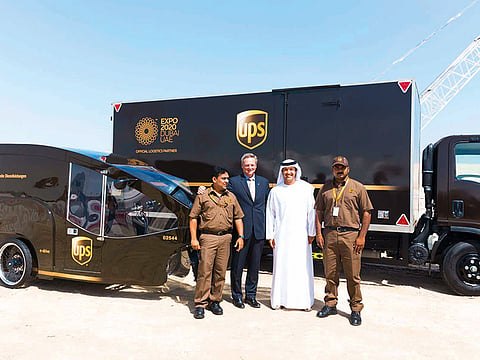UPS sees opportunity in region’s reforms, booming e-commerce sector
Logistics company’s international president says they are ready to make some ‘big bets’ in Saudi Arabia

Dubai: The international head of logistics company UPS says that whilst he is extremely upbeat about the Middle East, he thinks the company still has a long way to go.
“Our fastest growing international business unit is the Middle East,” Barber told Gulf News in a recent, wide-ranging interview, but when asked about the state of the company’s network, Barber said: “Am I happy with our Middle Eastern network? Absolutely not.”
Of course, he added, there had been “issues with Qatar, and issues with Saudi’s border and customs” that had hampered the company last year, but overall, Barber said, he was pleased with the region’s growth.
The Atlanta-based postal service has previously acknowledged it was late to arrive in the Middle East. Competitors such as DHL and Aramex were already entrenched by the time UPS opened its regional headquarters in Dubai.
Despite the slow start, UPS has since made up for lost time: In May 2017, the firm was announced as the official logistics partner of the Expo 2020 Dubai, providing more than 27,000 square meters of warehouse space, equivalent to four football fields, and a team of 1,000 employees during the expo.
“The first trip I took this year, in the first week of January, was to the Middle East, to Saudi, Kuwait, and then to Dubai. We’re focusing on emerging trade patterns,” Barber said.
“We’re bullish on the Middle East in a very big way,” and much of the company’s recent international success, highlighted in the firm’s results last week, was because of the region, he added.
This year, he said, his “highest focus region” would be the Middle East. That comes after last week’s announcement that UPS would sink $6.5 billion (Dh23.87 billion) in to improving its delivery network, which was in part due to UPS’ struggle during the US holiday season surge, causing bottlenecks that cost the company $125 million.
Analysts say the issue highlighted the firm’s inability to effectively deal with the large volumes of packages brought about by e-commerce.
Noting the impact that e-commerce was having in the Middle East, Barber said that Mohammad Al Abbar’s Noon, Amazon’s Souq, and Kuwaiti retail giant Alshaya, who are increasingly present in the digital space, would “massively shape the e-commerce landscape over the next five years.”
“Saudi [Arabia] will be a showdown for this market in the years to come, and UPS has the great foundations there to participate in that,” Barber added. The president said that he believes the leadership in the kingdom sees UPS as a close partner.
“We have nice investments in the kingdom, [and] I spend a lot of my time supporting that,” he added.
According to the top executive, UPS is preparing to capitalise on Saudi Arabia’s growth, putting “some big bets down in kingdom, maybe even this year.”
“To play in Saudi [Arabia] and Egypt, to really unlock the potential there,” would require solid partners, he added.



